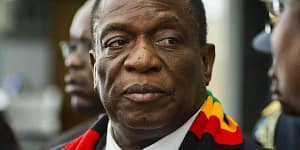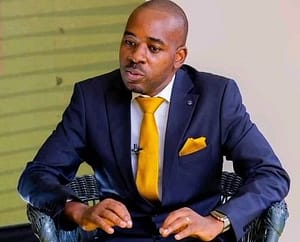A critical examination of the Musengezi v Mnangagwa and ZANU PF litigation

Alex Magaisa
By Alex Magaisa
The case of Sybeth Musengezi v ZANU PF, Emmerson Mnangagwa, and others has captured the attention of the media and citizens. Musengezi says he is a member of ZANU PF who is aggrieved by how the succession of Mnangagwa to the helm of ZANU PF was handled four years ago when former leader President Robert Mugabe was toppled in a palace coup.
In defining the nature of the litigation, it is important to clarify what it is not about. Musengezi is not challenging Mnangagwa’s presidency of Zimbabwe. Rather, he is challenging Mnangagwa’s presidency of ZANU PF, the political party. He is not challenging the violation of the national constitution. Rather, he is challenging the alleged violation of ZANU PF’s constitution.
He argues that the ascendency of Mnangagwa to the party’s presidency violated the constitution of ZANU PF and wants it corrected. In this way, Musengezi’s case bears a strong resemblance to a case that was brought against the MDC in 2018 by Elias Mashavira who argued that the MDC constitution had been violated. It is impossible to examine the Musengezi case without reference to that critical precident. With Musengezi being a little-known political actor and Mnangagwa and ZANU PF being the president and ruling party of the country, this is a David against Goliath affair.
The application was lodged at the High Court and as required by law; the respondents submitted their response, focusing predominantly on technical defences. Technical defences are where a party seeks to have the matter dismissed on procedural aspects, without going into the merits of the matter. In the past few days, however, the matter has drawn more attention after lawyers representing President Mnangagwa, ZANU PF and its officers cited in the proceedings wrote a highly charged correspondence to Musengezi’s lawyers. Musengezi’s lawyers responded, expressing reservations at the communication from the opposite end. This sideshow between the lawyers is unnecessary, serving only to obfuscate the crucial dispute between the parties which requires a judicial resolution.
The exchange between the lawyers has escalated matters and left many observers wondering what is going on. They asked for an explanation as to the implications of the exchanges between the lawyers. I have taken the decision, not without some reluctance since the matter is before the courts to examine the proceedings and their implications. Since the matter is playing out in the public arena, it is fair game and worthy of academic commentary. Law is a notoriously adversarial subject, one view often attracting an equal and opposite reaction. These are my observations on the ongoing matter and no doubt there may be many more.
Presidential Immunity
First, Mnangagwa’s lawyers have pleaded presidential immunity in response to Musengezi’s challenge. The national constitution confers immunity from any personal lawsuits while a president is in office. The relevant provision is section 98(1) of the constitution which states as follows:
“While in office, the President is not liable to civil or criminal proceedings in any court for things done or omitted to be done in his or her personal capacity.”
Much will depend on whether the court views Musengezi’s case as a lawsuit against Mnangagwa in his personal or official capacity. If personal refers to things done or omitted outside official duties as national president, it is arguable that matters to do with his role in ZANU PF fall in the personal realm. But it is important to note that presidential immunity is not absolute, which is why a sitting president can still be sued in his personal capacity in a presidential petition[1].
However, the question of presidential immunity does not need to detain us at length because it is not central to the legal proceedings brought by Musengezi against ZANU PF for violating its constitution. Assuming the court recognizes and upholds Mnangagwa’s immunity defence, it will have no impact on the central party to the action, which is ZANU PF. It is ZANU PF that Musengezi is suing, and ZANU PF does not have a claim to presidential immunity. It is axiomatic that an organization that is established a constitution has a distinct legal personality that separates it from its leaders and members. That is why in terms of its constitution, ZANU PF can sue or be sued in its capacity as a legal person. Presidential immunity is not transmitted by proximity, therefore even if the court were to uphold Mnangagwa’s immunity, it has no impact whatsoever on ZANU PF and the other individuals who are being sued by Musengezi. They must have their day in court because they are separate legal persons. It is improper to conflate the national presidency with the party. If it were the other way round, Mnangagwa would not enjoy immunity because he would not be facing legal action in his personal capacity.
If anything, it is in Mnangagwa’s interests to be cited so that he can make representations in a matter whose outcome might affect him. It would have been odd, if not outrightly unfair, to omit him from the proceedings when the issues have a direct impact on Mnangagwa’s rights and interests. Pleading immunity may let him off the case, but it deprives him of the opportunity that Musengezi had offered him to make representations to safeguard his rights and interests. As it is, if his plea of immunity is upheld, Mnangagwa may be dropped off from the proceedings but that on its own will not stop the proceedings against ZANU PF and other officers. The court will have to find another ground to dismiss Musengezi’s case against these parties. In a nutshell, the defence of presidential immunity does not save ZANU PF and its other officers from Musengezi’s legal proceedings.
Exhaustion of Internal Remedies
Mnangagwa and ZANU PF argue that Musengezi should be barred because he did not exhaust all internal remedies in ZANU PF before approaching the court. They are referring to the principle that a person must exhaust internal remedies within an organization before approaching the courts for relief.
Ordinarily, this would be a plausible argument that was upheld by the High Court in the case of Bhasikiti v ZANU PF in 2015. Bhasikiti had challenged his expulsion from ZANU PF. Justice Bhunu who presided over the matter dismissed his case on the technicality that he had not exhausted the party’s internal remedies. Bhasikiti had argued that President Mugabe was an interested party because he chaired the relevant organs of the party and would not, therefore, get a fair hearing. However, Justice Bhunu told him that Mugabe could recuse himself and allow other committee members to hear Bhasikiti’s case. This case seemed to have sealed the plea of exhaustion of internal remedies. However, the courts made an about-turn in the case of Mashavira v MDC-T and others in 2019 and 2020.
In that case, the MDC-T pleaded the same technical defence that Mashavira had not exhausted the party’s internal remedies before approaching the courts. If the High Court had followed the Bhasikiti precedent, Mashavira’s case would have been thrown out at the preliminary stage. However, the court reasoned that Mashavira could not be regarded as having failed to exhaust internal remedies in a situation where his prospects of getting redress were severely curtailed. In other words, a system that is skewed against an individual cannot be regarded as presenting any remedies at all.
The High Court judge’s view was affirmed by the Supreme Court. Justice Patel who wrote the leading judgment stated that “There was no point in invoking domestic remedies that had been both politically and practically undermined”. The judges reasoned that the domestic remedies had been undermined by the fact that the person who was being challenged had taken effective charge and control of the party leadership and hierarchy. According to the judge, this control meant that Mashavira “would not have found any comfort in pursuing the internal remedy theoretically availed under Article 14 of the Party constitution”[2]
It is impossible to imagine how Musengezi’s position can be regarded as being any different from Mashavira’s in the above case. If the court found that Chamisa had taken effective control of the MDC-t and that this had “politically and practically undermined” the existing domestic remedies, how could the same court not recognize that Mnangagwa has taken effective control of ZANU PF and that this has “politically and practically undermined” the existing domestic remedies?
The courts may try to wriggle out of it by making spurious distinctions from the Mashavira case, but this will only expose systemic hypocrisy and bias. It will confirm suspicions of those who fear that when it comes to matters that have a political flavour, courts apply different rules to ZANU PF and the MDC, with greater softness and leniency towards ZANU PF. The judges tied themselves in knots in the Mashavira case when they ignored the Bhasikiti precedent and intervened where they should have exercised more caution. But having made their bed with the Mashavira precedent, they must now sleep in it. The reasoning they applied for the intervention where domestic remedies had not been exhausted in the Mashavira case applies with equal, if not greater force in the Musengezi case. It would be hypocritical to deny Musengezi his day in court because he has not exhausted internal remedies in ZANU PF, when they found favour for Mashavira.
The mootness of the matter
Mnangagwa and ZANU PF also want Musengezi’s matter dismissed because, they argue, the issues it raises are now moot. In other words, there is no longer a live dispute and issues are now only of academic interest and there is no point for the court to raise them. However, in the Mashavira case, the Supreme Court dismissed the argument that the matter was moot, reasoning that mootness is not an absolute bar to the justiciability of a matter. “The court retains its discretion to hear a moot case where it is in the interests of justice to do so,” wrote Justice Patel in the leading judgment. Citing legal authorities, Justice Patel concluded that “the court may exercise its discretion to hear a moot issue because of its significance, practical or otherwise, and the need for an authoritative determination on that issue in the interests of justice”.
Justice Patel agreed that Nelson Chamisa and his allies were “in de facto and effective control” of the MDC adding that there was “nothing to suggest that the situation will not continue for some time or that the [Chamisa] is likely to be eclipsed and supplanted as the leader of the [MDC] in the foreseeable future. While the Court cannot with any accuracy predict the future political path of the Party, we certainly cannot totally disregard the political realities on the ground”. This analysis led Justice Patel to conclude that the matter was moot[3]. This would have led to the dismissal of Mashavira’s case. But Justice Patel was not done yet. The finding of mootness was not the end of the matter, the judge wrote before listing reasons to justify making a definitive judgment on a moot case.
The first reason to ignore the mootness of the matter was the status of the party and its potential to be the ruling party. He reasoned that given the performance of the MDC in the 2018 general elections meant that it was a significant player in the country’s politics. Secondly, the judge referred to the party’s constitutional values as a social democratic party and reasoned that it was important to uphold party members’ rights to a constitutionally elected leadership. Having found that the constitution had been grossly violated, the court believed it was necessary to take corrective measures[4]. The judge even referred to the values and principles in the national constitution to justify intervention in a matter that he had found to be moot.
It is worth quoting in full the reason why Justice Patel believed it was necessary to make a definitive judgment in a moot matter. “In the final analysis, I take the view that the corrective intervention of this Court in the affairs of the Party is a matter of significant public importance, not only in relation to the Party and its members but also as regards the governance of political parties generally. It is necessary that the Court should deliver its definitive pronouncement on the legitimacy of the second appellant’s ascent to the presidency of the Party. It is further necessary to ensure that the leadership of the Party is constitutionally and lawfully ensconced. The imbroglio that the Party’s leadership has become entangled in may well be water under the bridge. But it is a bridge that, for the sake of the Party’s stature and credibility, needs to be correctly and systematically constructed. In short, notwithstanding the political mootness of this matter, it is imperative that there should be an authoritative determination of this appeal in the interests of justice.”
Four points need emphasis here:
● First, the judge’s approach in the Mashavira case was not just of interest to the MDC, but to “the governance of political parties generally”. In this regard, Musengezi is dutifully responding to the judiciary’s clarion call. If this reasoning applies to Mashavira’s case, there is no reason why it should not apply to the Musengezi case unless the court applies double standards.
● Second, Justice Patel thought it was vital for the MDC leadership to be “constitutionally and lawfully ensconced” considering its status in society as the largest opposition party. With the potential to be the ruling party. If this reasoning applies to an opposition party, it goes without saying that it must apply to the ruling party.
● Third, the judge said although the matter was water under the bridge, it was necessary to reconstruct the bridge. Again, by parity of reasoning, if that bridge was so important in the opposition party, it must be even more important in the ruling party.
● Finally, Justice Patel concluded that although the matter was moot, it was “imperative” to make an “authoritative determination” in the “interests of justice”. It is impossible to imagine how if the interests of justice mattered so much in the Mashavira case, they cannot matter even more in the Musengezi case where the governing party is concerned.
To conclude this part, it would be hypocrisy of epic proportions if the court were to dismiss Musengezi’s case on the ground that the matter is now moot. It is only proper that similar matters be dealt with similarly. Mashavira’s case was against a political party in which he had an interest and he was challenging the lack of compliance with the party’s constitution in the succession process. Musengezi’s case is similarly against a political party in which he has an interest, and he is challenging the lack of compliance with the party’s constitution in the succession process. Even allowing the use of presidential immunity to shield President Mnangagwa from the lawsuit, both cases are primarily against political parties. They are sued because at law, they have a legal personality that separates them from members and the leadership.
Mnangagwa and ZANU PF would like Musengezi’s matter to be dismissed on technical grounds so that the courts do not have to hear arguments on the merits. In other words, they prefer Musengezi’s case to be thrown out so that they do not have to defend and justify the way the party handled Mnangagwa’s succession in 2017.
Locus standi
One point that Mnangagwa and ZANU PF have raised is that Musengezi is not a member of ZANU PF, therefore he lacks the locus standi (legal standing) to make the legal challenge. That is a question of fact that will depend on the weight of evidence before the court. Musengezi must prove that he is a member of ZANU PF, and it is up to ZANU PF to disprove his membership. In any event, Musengezi must demonstrate that he has sufficient interest in the matter.
It is worth pointing out that the Supreme Court suggested a less rigid approach to matters of locus standi in matters of this kind. “… where a political party bedeviled by a leadership wrangle is involved, it may be necessary to adopt a less rigid approach to questions of locus standi and authority to depose. The principal mischief that is to be guarded against is to avoid the situation where the organization in question is litigated for by an unauthorized person without its specific sanction,” wrote Justice Patel in the case of MDC and Ors v Mashavira and Ors (2020) (which is generally referred to as the Mashavira case). While he was referring to representatives of political parties, it is only fair that the same non-rigid and flexible approach must be extended to the other side.
Litigating by correspondence
This week, lawyers representing Mnangagwa, ZANU PF, and other officers wrote a charged letter to lawyers representing Musengezi. They were demanding a withdrawal of Musengezi’s application. The tone of the letter was uncharacteristically intemperate. It included a threat that if the matter proceeded, they would be seeking costs de bonis propriis which is a fancy term for “out of one’s pocket”. In legal circles, this means the lawyer is being ordered to pay the legal costs in their personal capacity. Mnangagwa’s are therefore threatening Musengezi’s lawyers that they will seek an order that they pay the legal costs.
This is a serious charge against fellow professionals. Litigation is adversarial but lawyers generally observe professional cordiality, respect, and mutual toleration. This usually surprises litigants when they see their lawyers exchanging kind words and pleasantries outside court. A threat to push for costs de bonis propriis is therefore not a light matter. In the circumstances of a politically charged matter, the other lawyers might see it not just as disrespectful but also as intimidation.
There are situations where it might be said that a litigant is wasting the court’s time and pursuing a case without merit. Even so, it is totally against the letter and spirit of the national constitution which guarantees the right to a fair hearing, the right to administrative justice, and the right to be represented by a lawyer of your choice to erect walls that discourage citizens from litigating and lawyers from representing them. There is also no need to litigate by correspondence. Any arguments, technical or on merit must be left to the courts to determine.
Viewed in the context of the Supreme Court’s decision in the Mashavira case, which bears a strong resemblance, it is hard to imagine how the Musengezi case can be regarded as frivolous, spurious, and without merit to warrant a threat of imposing personal costs on the lawyers. The Supreme Court found the Mashavira case to be moot but still went on to give a determination. If it was good enough to apply to the MDC, it must be good enough for ZANU PF. The rules of the game must not change because ZANU PF is in the ring.
It is difficult to imagine what might have motivated Mnangagwa’s and ZANU PF’s lawyers to adopt such an emotionally charged and indecorous approach to fellow professionals. But it is the wisdom of the ancestors that when a blind man invites another person to a stone-throwing contest, it is probably because he has his foot on a stone.
I said as I began this article that this is a David against Goliath affair. But that was probably a fair contest. Musengezi faces a mammoth task, far greater than David’s because of the effects of Constitutional Amendment (No. 2) on the judiciary. Ultimately, he faces an opponent who gave a life-jacket to Zimbabwe’s ultimate judge when he was sinking into the deep and murky waters of retirement. Still, the judiciary must admire the fact that the young man trusts it to play a referee, even as the officious bystander has his doubts.
wamagaisa@yahoo.co.uk
atm@kent.ac.uk
–Alex Magaisa is a respected law lecturer at Kent University is UK






